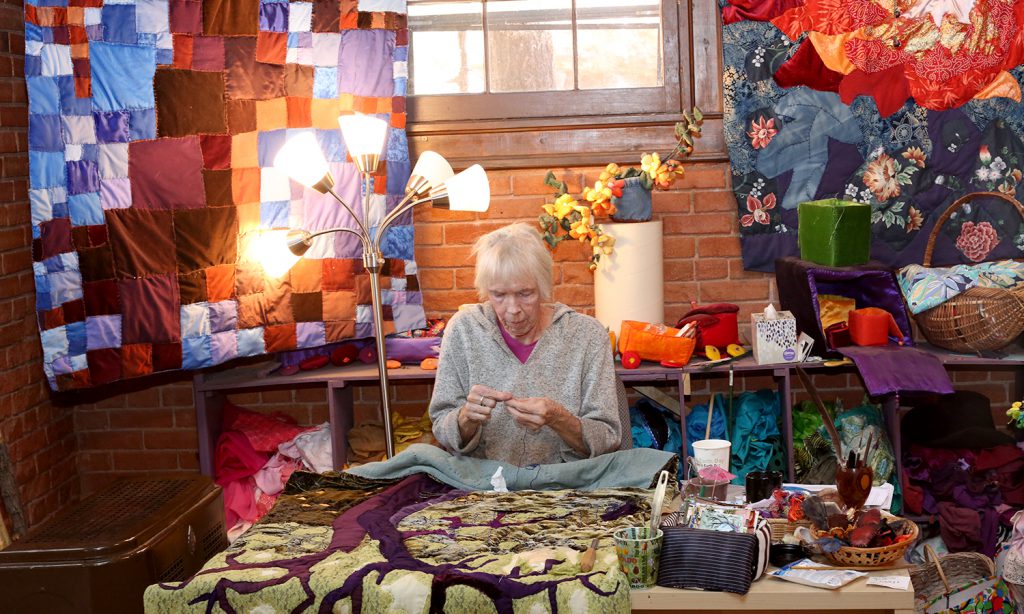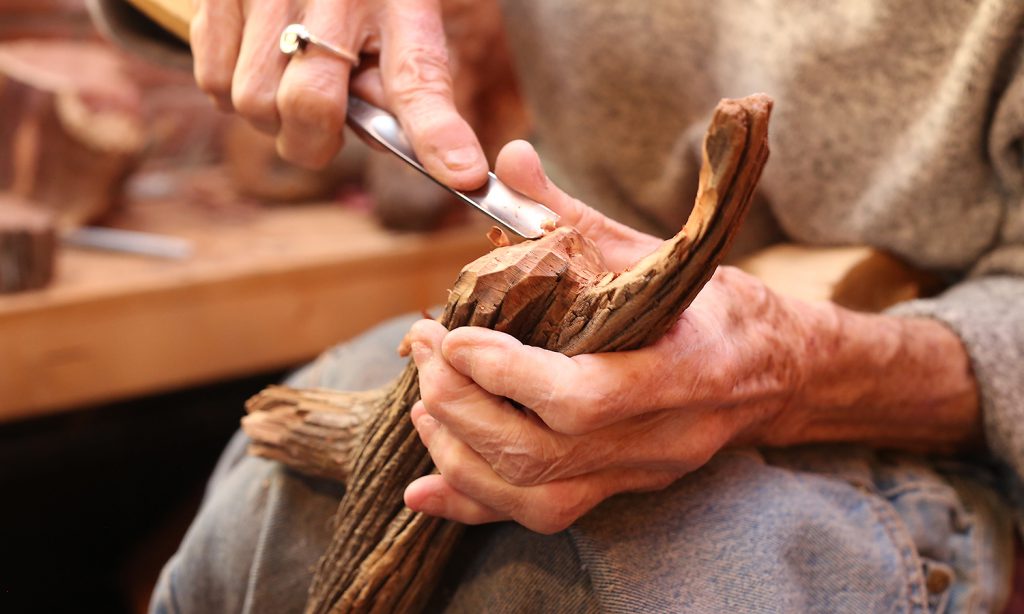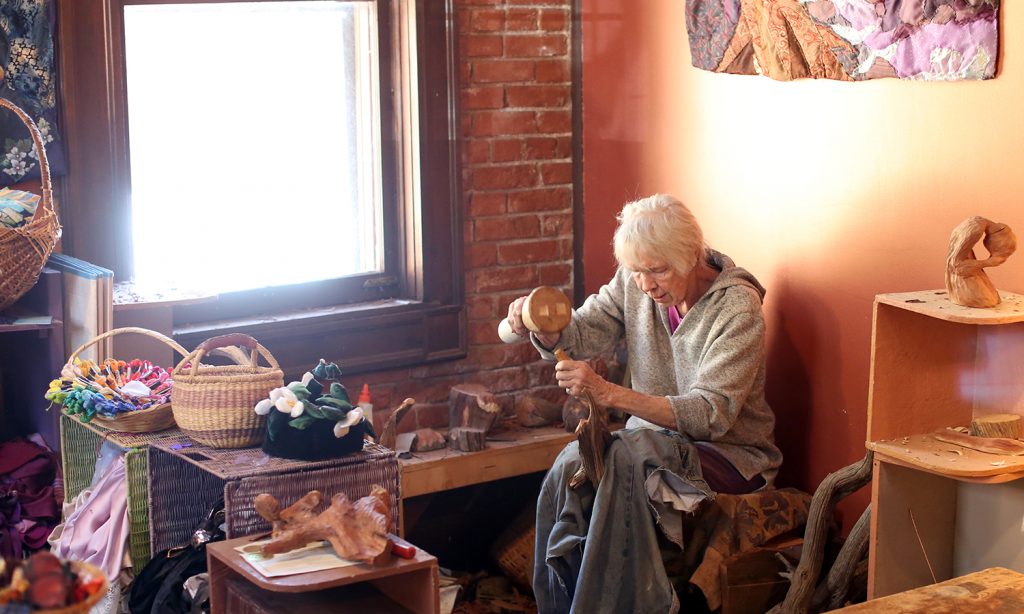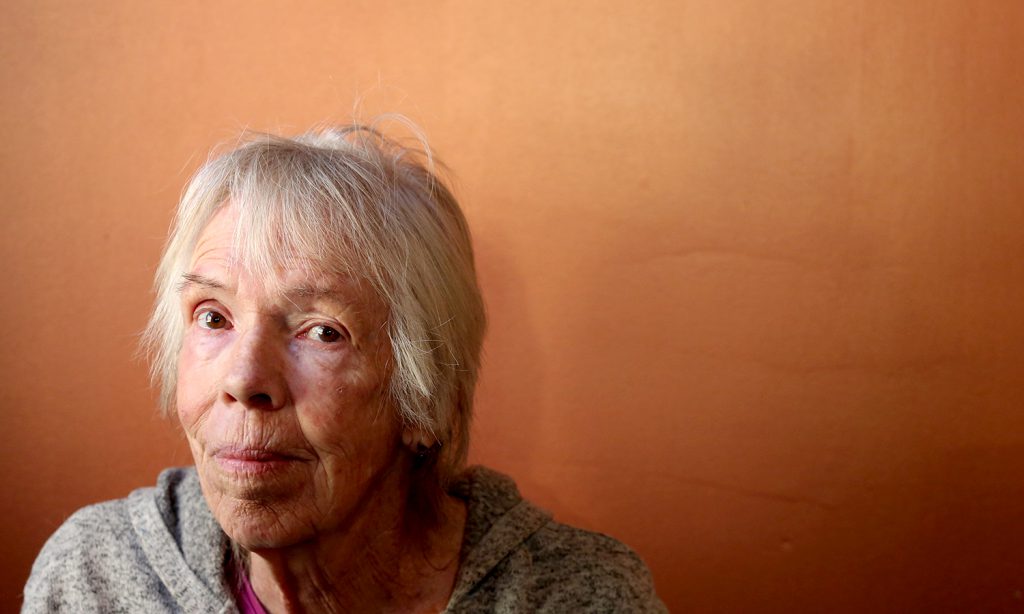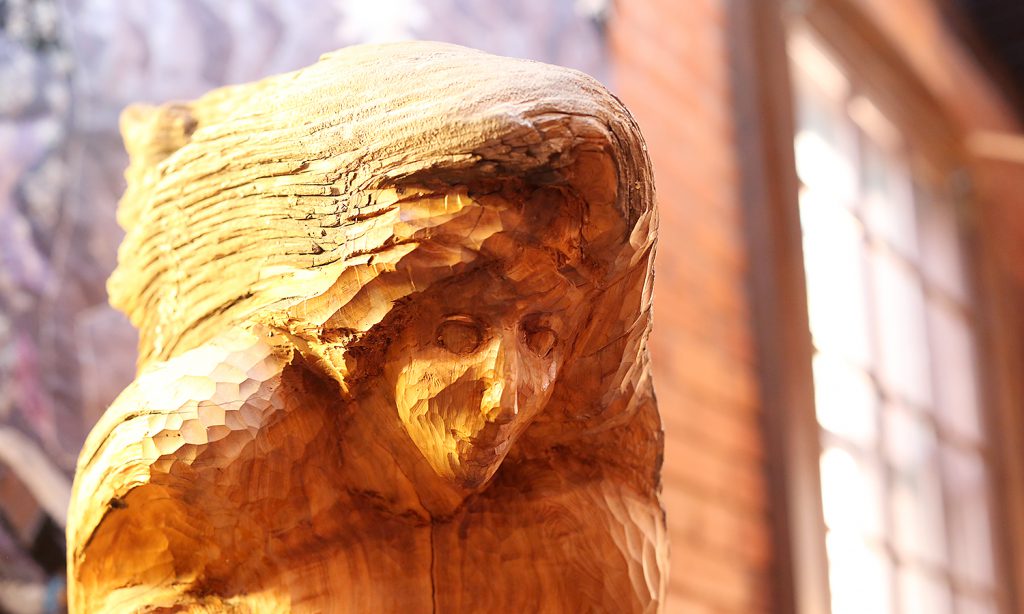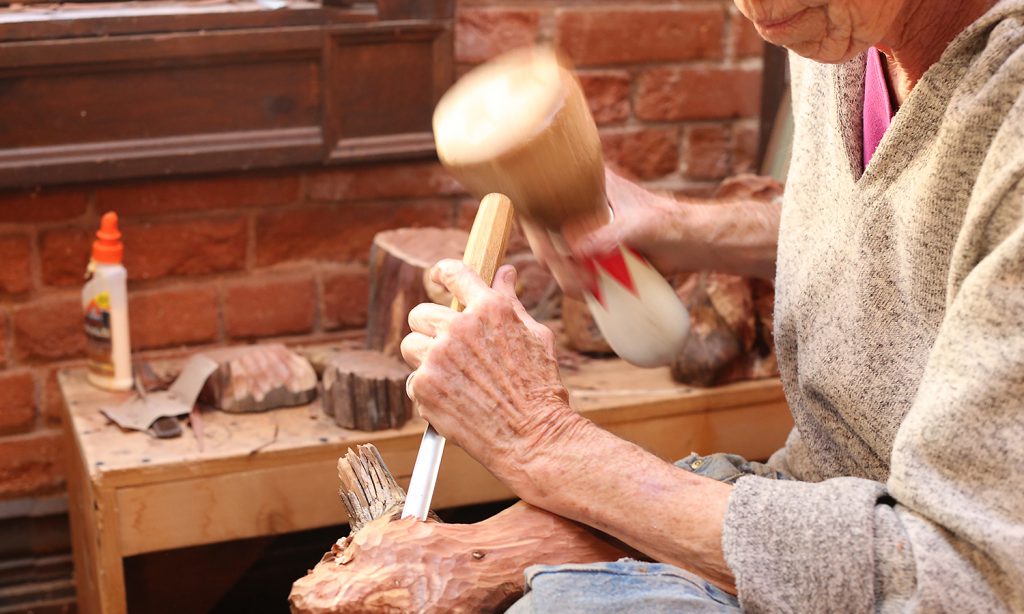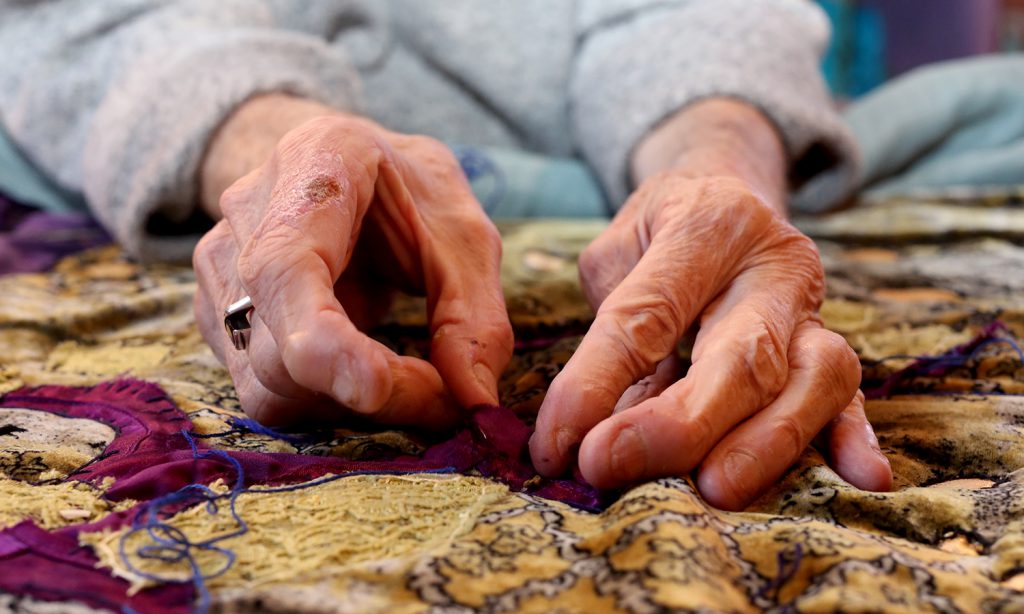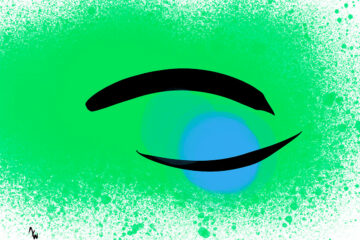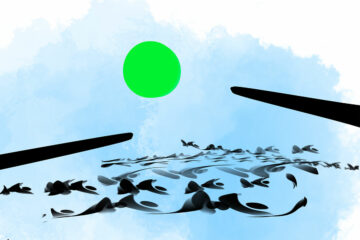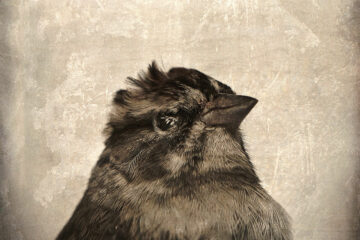Sophie Cowman sits quietly behind a table in her quiet shop along quiet Lovers Lane. On the days Sophie opens a window while she works, she can hear Fountain Creek in its perpetual run beneath her seat, beneath the shop’s bricks and floor boards.
Sophie has been carving wood in one shop or another — she’s in her fifteenth — since 1972 in Manitou Springs. Lately, her hands are more often busy with the needle, thread, fabric and colors of quilting. Still, a corner of her shop, with its wood-chip covered floor, is dedicated to carving.
With her hands on a quilt-in-progress spread in front of her, Sophie, 77, talks with Humanitou. We talk about her will for independence, and her transition in the Seventies from life in a convent to hitchhiking and hippie culture. We talk about a life made by hand from cedar and thread.
Humanitou: You’ve been in Manitou for 45 years. Where did you come here from?
Sophie: I was living in Portland, Oregon, and I decided to take a long hitchhiking trip around the country, and stopped here. I just stayed. This was a friendly place to be a wood carver.
Here, beautiful wood grew all over the hills as a native wood. The cedar not only has good scent but also has original shapes that guided me into doing hundreds, thousands actually, of pieces.
I was very motivated in those days. I didn’t want a real job. I would work as hard as it took to stay independent, and I did manage to pay the rent on house and shop for many years.
Then, my father stepped in and helped out with a little pension. He passed on. So, I’m comfortable now. I don’t have to do this, so I can do it without the pressure of need. But that helped me produce a lot of work.
Everyday I carved for five or six hours and, at the end of it, something was finished. There would be several pieces lined up unfinished. I would go out into the hills about once a month to cut dead branches off the juniper trees.
Cedar is a juniper cousin; it’s softer and purpler and more aromatic, and I just chose to use it only. It’s a beautiful wood.
Humanitou: How did you start with wood carving?
Sophie: I was in an art class, a sculpture class, and wood carving was included. I learned how to use the tools, and also how to finish a carving properly. I loved how it felt, so I kept doing it for a hobby.
I was a school teacher then. It was a good hobby for a school teacher; you get to go down and slam on wood after class. It was a good release. The furnace room was my favorite place. That’s where I’d go down to carve.
One day, someone took me to a Renaissance Faire, and that’s when I saw you could make a living by doing with your hands, you could make a living in a primitive way.
Here were all these crazy-looking people making a living with knotting ropes, for God’s sake, macramé. And so, I thought, I can carve.
I bought a little ring for three dollars that meant change of life. “Carve or starve” was my new motto. I took that trip, which got me here, and then I just kept on going from there.
Humanitou: You left Portland with this idea in mind?
Sophie: The trip was not related to carving. [At 32 years old] I just needed to see the world.
Humanitou: You were a teacher. What age? What subject?
Sophie: In a parochial school. I taught grade school and high school for 10 years. French, English, art. I was in a Benedictine community of sisters for 13 years.
Humanitou: You wore the habit? You were a nun?
Sophie: Yes, I was a Benedictine sister. Sister is a word a like better.
Humanitou: Why did you leave the convent?
Sophie: It was all limited. I kind of grew up there. There was too much else to do. It was like a cocoon I developed in. I learned some skills. I taught 50 kids, lots of kids, classrooms were full. It was cookin’; I was a hot teacher for a while.
I couldn’t stand the authority. Instead of doing what we saw we should do, the church was on top of us. The church said, “No. No. No. No.”
We were protected, secluded. So, I left and found the world had changed in the time I was gone from it. It wasn’t a scary, dangerous place anymore. It was full of brothers and sisters, hippies.
People were friendly. Men were brothers. Men were friendly, they weren’t predatory. Women weren’t competitive and all that nonsense. Everybody was trying to get down to basics, to strip off the phony parts and be authentic. Boy, there sure were a lot of different ways to be authentic.
So, I didn’t stick out at all, this reclusive, ex-nun. I should have, but I blended right in. I was no funnier looking, and the world was a friendly place. It was great; I loved it.
And I learned to smoke pot. It became a habitual thing in my life. It doesn’t get me high, or anything. It’s just a basic necessity. I hate that, but I don’t change it, either. It’s just a fact. It goes along with the hippie part. (laughs)
Humanitou: Do you consider yourself a hippie?
Sophie: No. For a while, I stuck out real funny. And then for a short time, the world caught up with me, to the way I looked, to the way I dressed, the way I thought. And then it moved on, dress-wise and so on.
I was really grateful that for a little while I was part of a whole culture, and I still am.
So, I’m not an ex-hippie. I was one of those hippies before there were hippies, in a mental sort of way. It was great to find the world had come around to my way of thinking.
I’m exaggerating all this. It wasn’t really true … partly true.
Humanitou: Do you have advice for others who dream of creating their own bold path like you have? A lot of people feel like you do about workaday jobs.
Sophie: A lot of people. I am the envy of many people.
So, was it luck? No, it wasn’t just luck. It was hard work. I have record books that fill a box. Every year, I kept records, since ’87. They show over 5,000 pieces done in the time I was keeping records.
But things were so much cheaper then, and I had no one to disappoint, no one to feed, no one to get mad at me. I was exploring in the world and avoided connections with people that would tie me down. I needed to get out and learn.
I had a lot of energy then. Talking to you reminds me that I had it.
Being famous never was my aim. But if you do something for a long, long time– I have a fan club of sorts. So, just keeping at it, wanting to do it so much that you keep doing it, is what I’m saying.
Humanitou: How have you kept your self-driven path going all these years?
Sophie: I’ve been following this road of creativity. Every day I do something for the shop. The shop is something I have to support, but it supports me, too. It connects me with the world. It’s where I get ideas and advice and friends. Otherwise, I’m shy and reclusive. My art would dry up.
It helps to put it out someplace. But putting it out with galleries and other shops, they get most of the income, for one thing, and you don’t get the fun of meeting the people who buy it. So, I wanted the whole circle.
I go out with my saw and find a good cedar limb and cut it off, and haul it home and find a piece in it, and carve it up and, one time, managed to get it out there in one day. Someone came in and bought it that day. It was such a direct connection with the whole circle of everything. It was perfect.
I was always needing money. Sometimes it was messier than like I’m making it sound. It was not clean, but I didn’t worry about dignity. I was here to make a living and not have a real job — and do it honorably, too.
Women always have this one coin, and I decided never to use that coin. For my own choice, but never to take the easy route. That isn’t easy, but, you know.
So, that kept me stubborn, too. I didn’t mind being rough and tough and unfeminine, if that’s what it took. I was out there doing work that men do, carrying and cutting.
I did the [tree trunk] piece in the park. I was proud of my muscles. I could arm wrestle and win. That’s a stupid thing for a woman to get proud about (laughs), but it’s what I had. I had a fun life being that way.
And that word, sister, when I was in the convent. When I left, I had the attitude of sister, so my relation with people was never the hustle or the flirting one or anything else. It was always, we’re related, sort of. And it got me by.
Humanitou: You have an array of wood carving tools on the wall–
Sophie: Those are Eddie’s tools. Ed Brooks shares the place with me. I use one tool (pulls it from her purse), this #7 gouge. It’s all I’ve used for 45 years. I’ve replaced it a number of times. It gets stolen or I loan it out or I give it away.
This one tool is a key to survival. It needs only a mallet. I have a bowling pin for a mallet. It’s strong, and it’s balanced just right.
Humanitou: How did you end up using a bowling pin as a mallet?
I was poor and I just needed anything wood [for a mallet]. Somebody gave me a bowling pin, and it was perfect, the way it’s balanced. I’m armed and dangerous. (smiles) Nobody knows that.
So, I’ve been swinging this thing for 45 years. I can take the gouge and mallet anywhere. The year I spent hitchhiking on the road, I took the tool. I made a living the whole way to Mallory Square in Key West and back. I carved my way the whole way.
Humanitou: You don’t carve as much these days. You focus more on quilting?
Sophie: Carving doesn’t really excite me. It seems like I’ve done all the forms possible many times.
But I am still excited by fabric. There’s so many different ways that fabric is made. It’s just awesome. It’s the most awesome man-made material in the world. The variety and beauty of it.
People have been giving me their old clothes and fabric pieces for years. I have a collection of great stuff. It’s still exciting to me to find ways to put it together that haven’t been done yet.
Stitching it together, there’s something kind of rhythmic about stitching.
Humanitou: How much time goes into each quilt? How much do you sell them for?
Sophie: About 50 to 60 hours. That’s not really very much.
$150. I’m not really doing them for money. That gives me about three bucks an hour. But that’s what people can afford.
Humanitou: You chose to stay in Manitou. It’s been a long time. What does Manitou mean to you?
Sophie: It’s an open place. It welcomes people who come with energy and a sincere desire to somehow make this work. I hook it up to its historical place. It was a place people came, an energy place.
As far as the people, they’re a kind of family. They adopt their people, they take care of their people. They are glad for their artist people and the great politicians that we’ve had.
It’s a small enough town that you’ve got to watch out for it, too. Gossip. Man.
Humanitou: You’ve followed your road of creativity. What does it mean to you to be creative?
Sophie: Creativity is kind of this curiosity about what can you do, what can I do with this material, what is out there? It’s curiosity-driven, partly. And mine was, partly, survival-driven.
So, sometimes you’re forcing it. I believe discipline is a part of life, part of what we’re supposed to learn. And, so, even if I didn’t want to carve, it was sometimes a real job.
In general, I worked through those times.
 This Humanitou conversation is cross-posted at PeakRadar.com. | PeakRadar.com is the Pikes Peak region’s cultural calendar and digital cultural center, connecting residents and tourists with our vibrant arts community. Your source for what’s happening is PeakRadar.com!
This Humanitou conversation is cross-posted at PeakRadar.com. | PeakRadar.com is the Pikes Peak region’s cultural calendar and digital cultural center, connecting residents and tourists with our vibrant arts community. Your source for what’s happening is PeakRadar.com!
